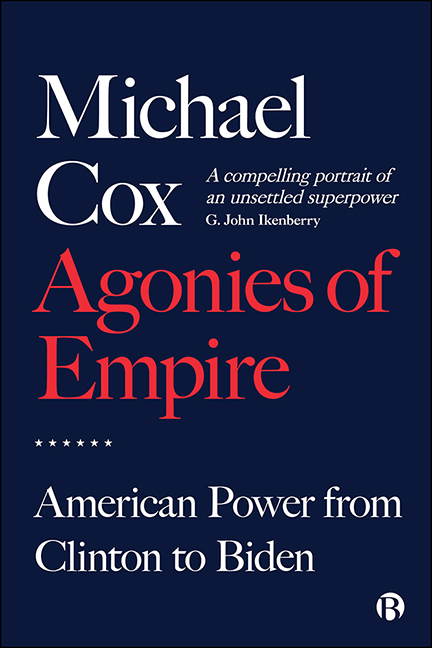Book contents
- Frontmatter
- Dedication
- Contents
- About the Author
- Preface
- Introduction: The Rise of an Empire
- PART I Clinton: Liberal Leviathan
- PART II Bush Jnr: Empire in an Age of Terror
- PART III Obama: Towards a Post-American World?
- PART IV Trump: Turbulence in the Age of Populism
- PART V Biden: Is America Back?
- Notes and References
- Acknowledgements
- Index
5 - Empire, Imperialism and the Bush Doctrine
Published online by Cambridge University Press: 15 September 2022
- Frontmatter
- Dedication
- Contents
- About the Author
- Preface
- Introduction: The Rise of an Empire
- PART I Clinton: Liberal Leviathan
- PART II Bush Jnr: Empire in an Age of Terror
- PART III Obama: Towards a Post-American World?
- PART IV Trump: Turbulence in the Age of Populism
- PART V Biden: Is America Back?
- Notes and References
- Acknowledgements
- Index
Summary
Introduction
It is an empire without a consciousness of itself as such, constantly shocked that its good intentions arouse resentment abroad. But that does not make it any the less of an empire, with a conviction that it alone, in Herman Melville's words, bears ‘the ark of liberties of the world’.
If all history according to Marx has been the history of class struggle, then all international history, it could just as well be argued, has been the struggle between different kinds of empires. Empires, however, were not just mere agents existing in static structures. They were living entities that thought, planned, and then tried to draw the appropriate lessons from the study of what had happened to others in the past. Thus, Rome learned much from the Greeks, the British in turn were inspired by the Romans, and the British liked to think that they were passing on their imperial knowledge to their Atlantic cousins at the end of the Second World War, remarking as they did so that like the sophisticated ‘Greeks’ of old, they were now transferring responsibility to those untutored but extraordinarily powerful ‘Romans’ who happened to be living besides the Potomac.
Nor were the Americans themselves unaware of the historical stage onto which they were now stepping. Certainly, one of the more important architects of the post-war order was quite clear in his own mind about the importance of empires in history. A great admirer of the British Empire himself, Dean Acheson talked in almost glowing terms of the indispensable economic and strategic role played by Britain in the previous century, the obvious conclusion being that what the British had done for the peace and prosperity of the world after Waterloo, the Americans would now do in an era turned upside down by war, revolution and the rise of a modern revolutionary state in the shape of the Soviet Union. His British peers could not have agreed more. Indeed, like Acheson, they took the long view, pragmatically concluding that if they had to pass on the imperial torch to anyone, far better it went to their white Anglo-Saxon allies across the Atlantic than to anybody else.
- Type
- Chapter
- Information
- Agonies of EmpireAmerican Power from Clinton to Biden, pp. 63 - 76Publisher: Bristol University PressPrint publication year: 2022



